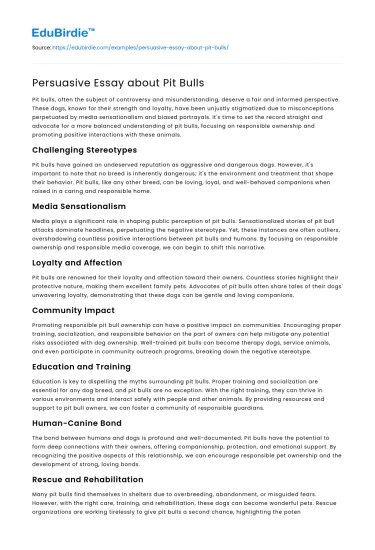Pit bulls, often the subject of controversy and misunderstanding, deserve a fair and informed perspective. These dogs, known for their strength and loyalty, have been unjustly stigmatized due to misconceptions perpetuated by media sensationalism and biased portrayals. It's time to set the record straight and advocate for a more balanced understanding of pit bulls, focusing on responsible ownership and promoting positive interactions with these animals.
Challenging Stereotypes
Pit bulls have gained an undeserved reputation as aggressive and dangerous dogs. However, it's important to note that no breed is inherently dangerous; it's the environment and treatment that shape their behavior. Pit bulls, like any other breed, can be loving, loyal, and well-behaved companions when raised in a caring and responsible home.
Save your time!
We can take care of your essay
- Proper editing and formatting
- Free revision, title page, and bibliography
- Flexible prices and money-back guarantee
Media Sensationalism
Media plays a significant role in shaping public perception of pit bulls. Sensationalized stories of pit bull attacks dominate headlines, perpetuating the negative stereotype. Yet, these instances are often outliers, overshadowing countless positive interactions between pit bulls and humans. By focusing on responsible ownership and responsible media coverage, we can begin to shift this narrative.
Loyalty and Affection
Pit bulls are renowned for their loyalty and affection toward their owners. Countless stories highlight their protective nature, making them excellent family pets. Advocates of pit bulls often share tales of their dogs' unwavering loyalty, demonstrating that these dogs can be gentle and loving companions.
Community Impact
Promoting responsible pit bull ownership can have a positive impact on communities. Encouraging proper training, socialization, and responsible behavior on the part of owners can help mitigate any potential risks associated with dog ownership. Well-trained pit bulls can become therapy dogs, service animals, and even participate in community outreach programs, breaking down the negative stereotype.
Education and Training
Education is key to dispelling the myths surrounding pit bulls. Proper training and socialization are essential for any dog breed, and pit bulls are no exception. With the right training, they can thrive in various environments and interact safely with people and other animals. By providing resources and support to pit bull owners, we can foster a community of responsible guardians.
Human-Canine Bond
The bond between humans and dogs is profound and well-documented. Pit bulls have the potential to form deep connections with their owners, offering companionship, protection, and emotional support. By recognizing the positive aspects of this relationship, we can encourage responsible pet ownership and the development of strong, loving bonds.
Rescue and Rehabilitation
Many pit bulls find themselves in shelters due to overbreeding, abandonment, or misguided fears. However, with the right care, training, and rehabilitation, these dogs can become wonderful pets. Rescue organizations are working tirelessly to give pit bulls a second chance, highlighting the potential for positive change when we treat these dogs with compassion and patience.
Promoting Positive Interactions
Creating positive interactions between pit bulls and the community is essential to overcoming prejudice. Public events, training classes, and educational programs can help familiarize people with the true nature of these dogs. Encouraging individuals to meet well-trained and socialized pit bulls can help dispel fears and shift perceptions.
Legislation and Advocacy
Laws and regulations targeting specific breeds, commonly known as breed-specific legislation (BSL), can perpetuate the negative stereotypes around pit bulls. Advocacy efforts should focus on encouraging responsible dog ownership across all breeds rather than targeting one specific type. By working together to promote responsible ownership and education, we can address the root causes of any negative behavior.
Conclusion
It's time to challenge the misconceptions and stigmas associated with pit bulls. These dogs have the potential to be loving, loyal, and positive additions to families and communities. By focusing on responsible ownership, education, and promoting positive interactions, we can reshape public perception and advocate for fair treatment of pit bulls. It's up to us to change the narrative and give pit bulls the chance they deserve to show their true colors as wonderful, affectionate companions.






 Stuck on your essay?
Stuck on your essay?

